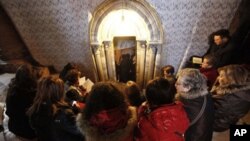The uprisings in Egypt and the Arab world do not seem to be hurting tourism in Jerusalem and the Palestinian territories. In fact, in some cases, merchants say the unrest may be driving more visitors to holy sites in Jerusalem’s Old City and the West Bank, which have been relatively peaceful in recent years.
In the past, many tourists visiting the Holy Land from Europe, Russia, Africa and the United States have started their tours in Egypt and then traveled from the Sinai Peninsula to sacred sites in Jerusalem and the West Bank.
But businessmen like Makram al-Arja, who owns the well-known Everest hotel in Beit Jala overlooking Bethlehem, say political unrest in Egypt has led to a sharp increase in tourists heading directly to the West Bank and Jerusalem.
"Now what has happened in the time since the protests started in Egypt, all the people, they have already registered in the hotels in Egypt," said al-Arja. "But they are afraid to stay in Egypt. From this way they start to move directly to us and to find more rooms and hotels in the Bethlehem area and Jerusalem.
Although the month of February, falling between Christmas and Easter, is generally a low season for tourism in the Holy Land, large groups of pilgrims have been visiting the Church of the Nativity in Bethlehem, which is built over the site where tradition says Jesus Christ was born.
Business appears to be brisk at souvenir shops on Manger Square.
Music from a Polish folk singer Eleni Tzoka lures a group of Christian pilgrims from Poland into the Nativity Store, where owner Epiphany Victor Tabash uses a calculator to add up the cost of the keepsakes the tourists buy to take home.
"This is Palestine, you are in Palestine," said Tabash. "Forty-eight plus 30 is 78 dollars."
Father Larry Niese, a Catholic priest, is leading his flock of more than 50 tourists from the United States through the Church of the Nativity.
He says while some members of his congregation were worried about reports of sometimes violent uprisings in the Middle East, everyone decided to proceed with the journey.
"There is a concern, but nobody backed out on coming to the trip because we figured that if it was not going to be safe, the [U.S.] State Department would let us know," said Father Niese.
A short distance away from Bethlehem, the narrow alleys of Jerusalem’s walled Old City are congested with thousands of tourists visiting shops and holy sites.
Abramhi Howsah has owned a souvenir store in the Old City for 40 years and he is concerned that if uprisings in the Arab world continue, tourists may stay away from the region.
"Maybe some people from the West, you understand, from the [United] States or Europe, they are worried to come to the Middle East," said Howsah. "When they hear there is a problem in one place in the Middle East, so I think they are worried to come here. But, I think there is nothing to worry about."
Back in Bethlehem, where the Muslim call to prayer wafts over the mostly Christian tourists in Manger Square, the atmosphere is peaceful and calm.
U.S. pilgrim Peggy Barljen says she had some concerns about safety, but they evaporated during her trip to Bethlehem.
"We were very happy we could come to Palestine and see the Church of the Nativity because it is so beautiful," said Barljen.
So at least for now, the sometimes violent uprisings in the Arab world do not appear to be having an impact on tourism in Jerusalem and the West Bank.
In a normal year, the tourist season starts to build toward the Easter holiday in April, and merchants hope that what some are calling an awakening in the Arab world will not stop pilgrims from coming to the Holy Land.




